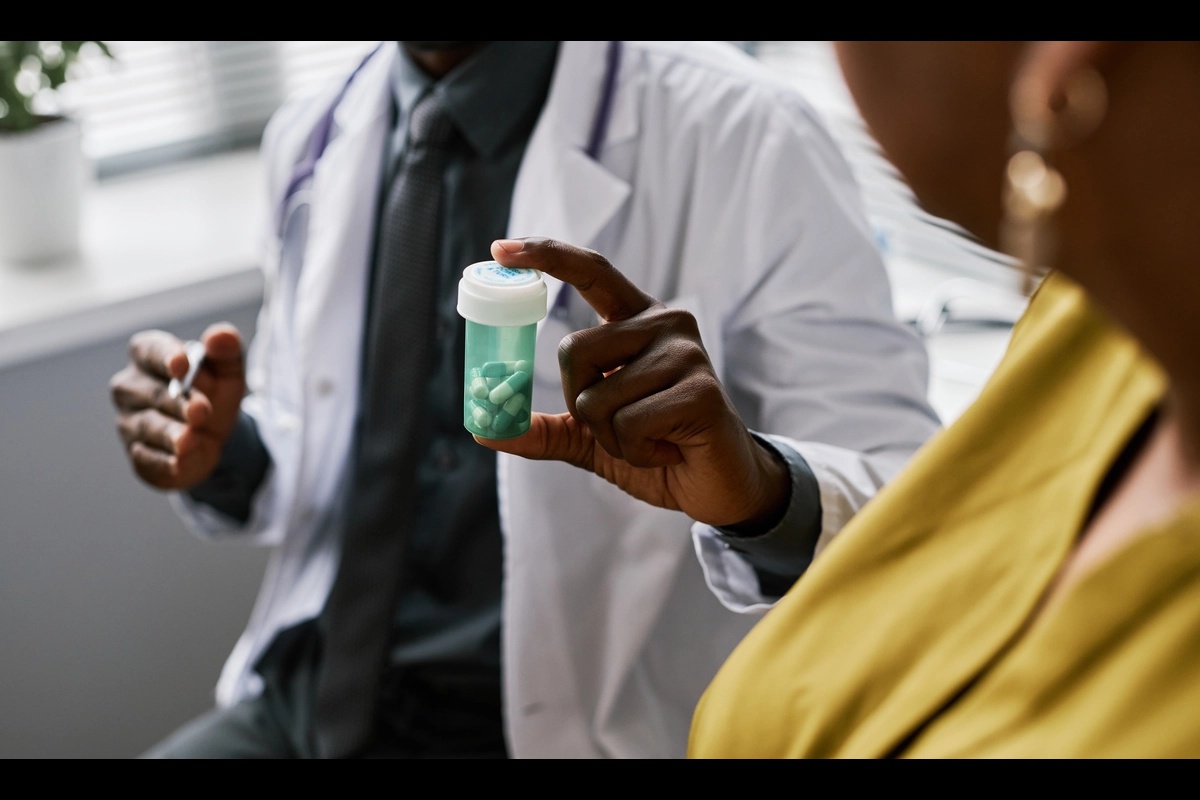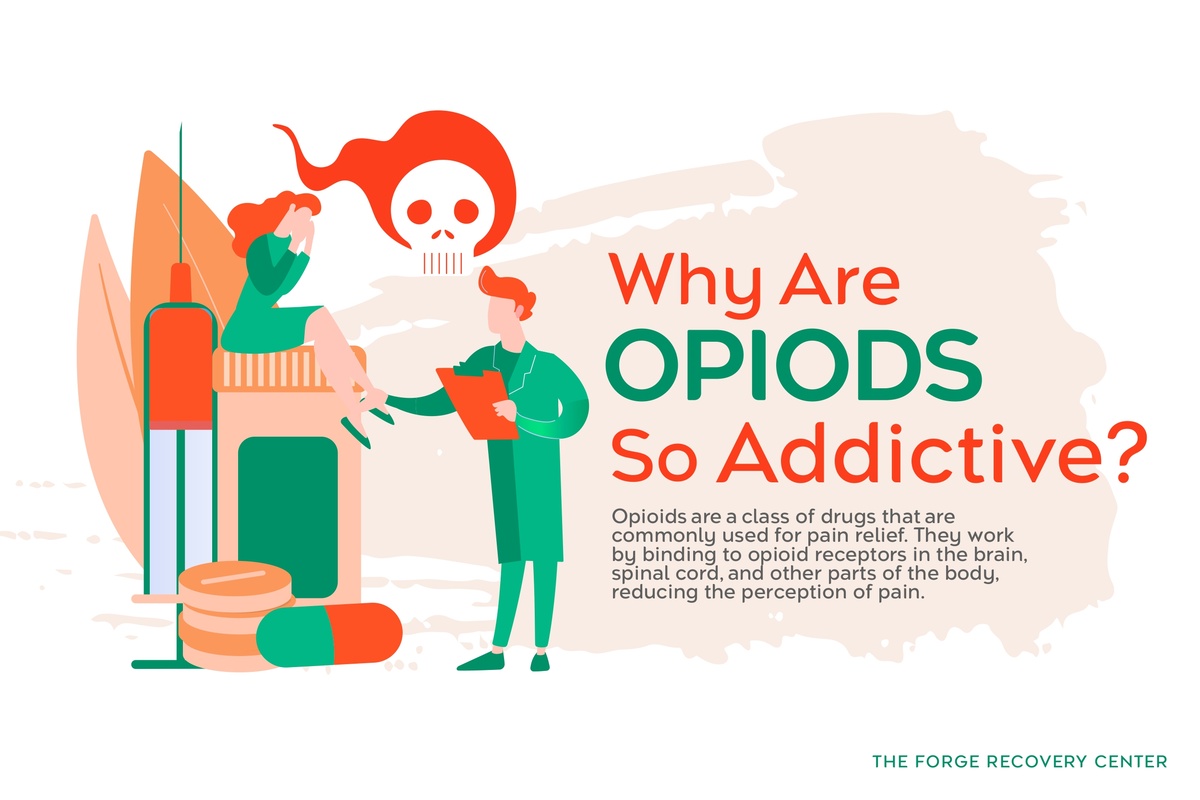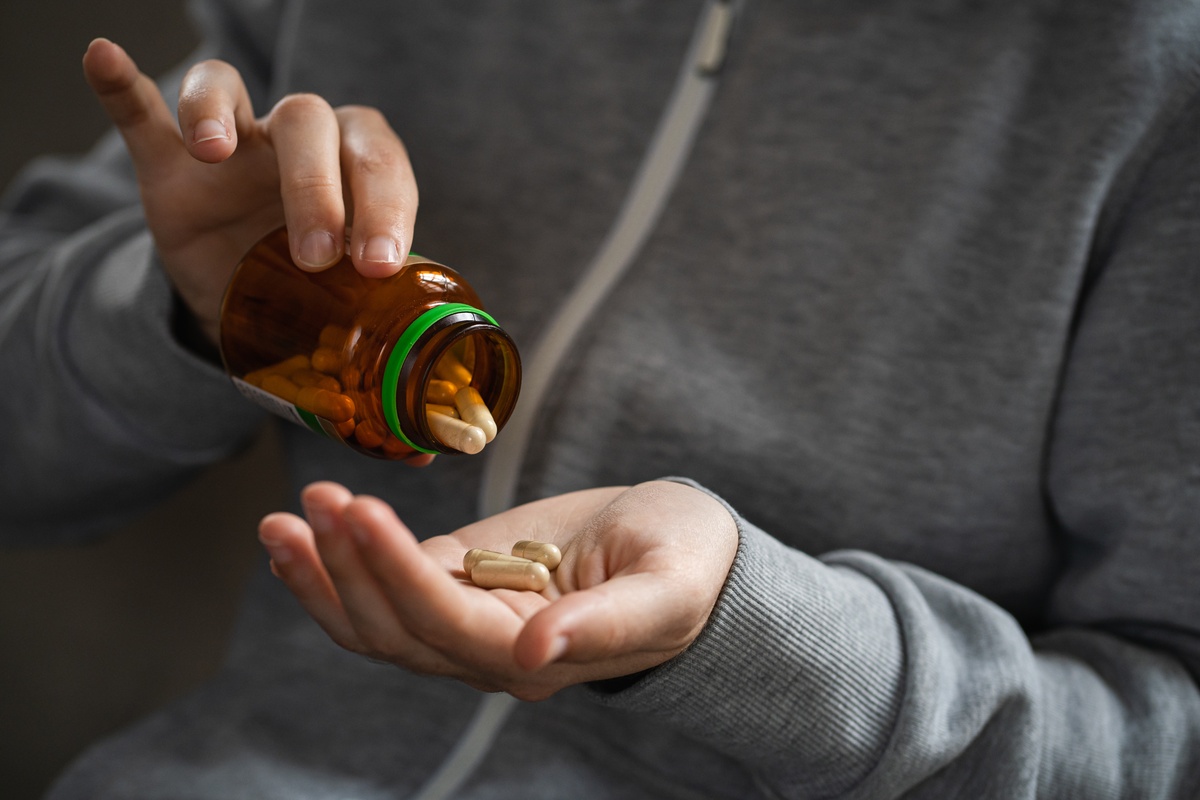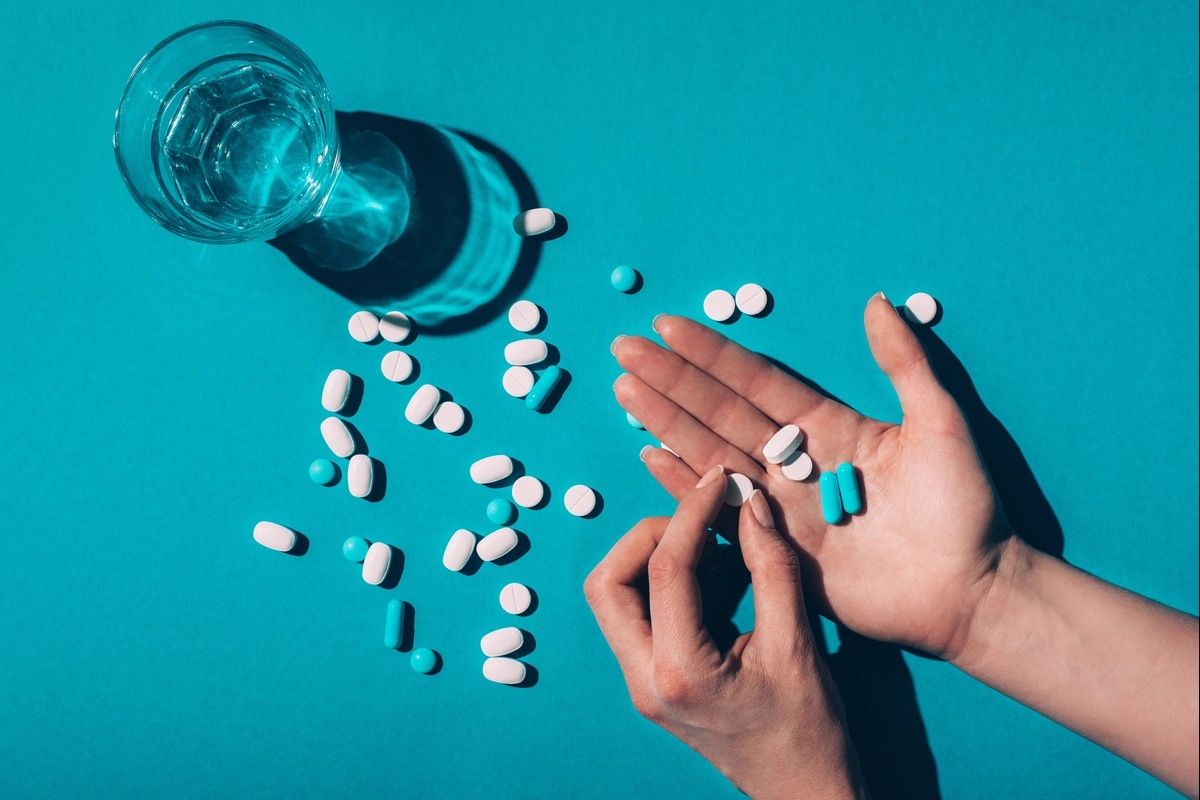Opioid Addiction: Symptoms, Causes, & The Need for Treatment


Opioid addiction disrupts every aspect of life, from your physical and mental health to your most treasured relationships. But you’re not alone, and comprehensive treatment is available. Learn more about the symptoms, causes, and treatment pathways for this substance use disorder — and if you or a loved one are looking for a guide on your recovery journey, contact The Forge Recovery Center today.
What Are Opioids?
Opioids are a class of drugs that are commonly used for pain relief. They work by binding to opioid receptors in the brain, spinal cord, and other parts of the body, reducing the perception of pain. Opioids can be both prescription medications, such as oxycodone and hydrocodone, and illegal drugs like heroin.
While opioids can be effective for managing pain, they also carry a risk of addiction and overdose if not used properly. Knowing this, it’s important to use opioids only as prescribed by a healthcare provider and to be aware of the potential risks associated with these medications.

Types of Opioids
Opioids can be classified into three categories: natural, semi-synthetic, and synthetic. Here's a rundown of drugs that belong to each class:
Natural opioids, like morphine, heroin, and codeine, originate from the opium poppy plant.
Semi-synthetic opioids, including oxycodone and hydrocodone, are derived from natural opiates but undergo chemical modifications.
Synthetic opioids, such as fentanyl and methadone, are entirely man-made in laboratories.
The differences in potency and effects among various types of opioids are crucial to understand. While natural opioids tend to be less potent than their synthetic counterparts, they can still be highly addictive. Synthetic opioids like fentanyl are much stronger, and pose a greater risk of overdose even in small amounts.
Disease or Disorder?
It's debated whether opioid addiction should be viewed as a disease or a disorder. Viewing addiction as a disease implies that it alters the brain's functioning and requires medical treatment rather than mere willpower. This perspective can lead to more compassionate approaches to treatment by recognizing addiction as a complex health issue.
Labeling opioid addiction as a disease can also contribute to advanced treatment approaches by shifting the focus towards evidence-based interventions, such as medication-assisted treatment (MAT) and counseling. By acknowledging addiction as a chronic illness, individuals struggling with opioid use can receive the support and care needed for long-term recovery.
The stigma surrounding addiction often influences how individuals with opioid use disorder are perceived by society. This stigma can create barriers to seeking help and lead to feelings of shame or guilt among those affected. Understanding the impact of stigma on individuals battling opioid addiction is key to promoting empathy and providing non-judgmental support for their recovery journey.
What Is Opioid Addiction?
Opioid addiction is a complex condition characterized by the compulsive use of opioids despite negative consequences. Opioids are a class of drugs that include prescription pain relievers like oxycodone, hydrocodone, and morphine, as well as illegal drugs like heroin.
When someone becomes addicted to opioids, their brain chemistry changes, leading to a strong craving for the drug and difficulty controlling its use. This can result in physical dependence, withdrawal symptoms when not using opioids, and a range of social, psychological, and health problems. Treatment for opioid addiction often involves a combination of medication, therapy, and support to help individuals overcome their addiction and regain control of their lives.

Are You Struggling with Mental Health or Addiction?
We Can Help. Call Us Now!
CALL: 877-839-1772
Opioid Addiction Symptoms
Opioid addiction carries both physical and psychological symptoms that can reach a severe degree if left untreated. Here’s an overview of the symptoms associated with opioid addiction:
Physical Symptoms
When dealing with opioid addiction, you may experience various physical symptoms. These can include changes in sleep patterns, such as insomnia or oversleeping. You might also notice weight loss due to decreased appetite and metabolism.
Physical dependence on opioids often results in withdrawal symptoms when you try to reduce or stop opioid use. These symptoms can range from mild discomfort to severe pain, nausea, and sweating. The impact of opioid addiction on your physical health and well-being can be profound, affecting your overall quality of life.
Psychological Symptoms
Psychological symptoms are another aspect of opioid addiction that you may encounter. You might experience intense cravings for opioids, leading to persistent thoughts about using them. Behavioral changes, such as secrecy or sudden mood swings, can also be indicators of opioid addiction.
Long-term opioid use can have significant mental health implications, contributing to anxiety, depression, and other psychiatric disorders. Opioid addiction can disrupt your normal mood and cognitive function, making it challenging to focus or make decisions effectively.
Opioid Addiction Treatment Overview
Treatment for opioid addiction involves detoxification, a combination of therapy and medication at an inpatient or outpatient rehab center, and aftercare. Here’s how the process works:
Detoxification
Detoxification is the initial step in opioid addiction treatment, aiming to rid your body of opioids. It involves managing withdrawal symptoms as your body adjusts. The process can be challenging, with potential risks like severe cravings and mood swings. Medical supervision during detox is crucial to ensure safety and provide necessary support.
Inpatient Rehab
Inpatient rehabilitation programs offer a structured environment for intensive treatment. Here, you receive 24/7 care and support from healthcare professionals. Therapy sessions help you address underlying issues contributing to addiction. The immersive nature of inpatient rehab allows you to focus solely on recovery without distractions.
Outpatient Treatment
Outpatient treatment provides flexibility by allowing you to attend therapy sessions while living at home. These programs typically involve counseling and medication management to support your recovery journey. While offering accessibility, outpatient treatment requires strong commitment and accountability from you. Regular monitoring and ongoing support are essential components of outpatient care.
Aftercare
After completing a rehab program, aftercare plays a crucial role in maintaining long-term sobriety. Support groups, counseling sessions, and relapse prevention strategies are key elements of aftercare programs. Family involvement is vital in providing a supportive environment post-rehabilitation. By participating in aftercare, you continue to build coping skills and stay connected with a supportive community.
Are You Struggling with Mental Health or Addiction?
We Can Help. Call Us Now!
CALL: 877-839-1772
Medication-Assisted Treatment & Opioid Addiction
Medication-assisted treatment (MAT) is a common therapy used in treating opioid addiction. Medications like methadone and naltrexone have shown success in helping to prevent relapse, among others. Here’s a summary of the types of medications used in MAT and its effectiveness:
Types of Medications
When it comes to treating opioid addiction, different medications play a crucial role. Methadone and buprenorphine are commonly used to help individuals overcome addiction. These medications work by reducing cravings and alleviating withdrawal symptoms, making the recovery process more manageable for those struggling with addiction.
Effectiveness & Use
Medications like naltrexone have shown effectiveness in preventing relapse among individuals recovering from opioid addiction. By blocking the effects of opioids in the brain, naltrexone helps reduce the risk of relapse, providing a valuable tool in maintaining sobriety post-treatment.
However, long-term medication use in opioid addiction treatment comes with its challenges and benefits. While these medications are effective in managing addiction, ensuring consistent adherence to the prescribed medication regimen is crucial for achieving positive outcomes. It's important to follow your healthcare provider's recommendations closely to maximize the benefits of medication-assisted treatment.

Diagnostic Criteria for Opioid Addiction
Opioid disorder has a specific set of criteria for diagnosis that you should be aware of if you or a loved one are seeking treatment. It also helps to understand the diagnostic process itself. Here’s an overview of how it works:
Assessment Process
When assessing opioid addiction, healthcare professionals follow specific diagnostic criteria to identify opioid use disorder. These criteria, outlined in the Diagnostic and Statistical Manual of Mental Disorders (DSM-5), include various symptoms that indicate the presence of addiction.
To diagnose opioid addiction, you must exhibit at least two out of eleven possible symptoms within a 12-month period. These symptoms range from cravings and tolerance to unsuccessful attempts to quit or significant time spent obtaining opioids.
Healthcare Professionals' Role
Healthcare professionals play a crucial role in evaluating and diagnosing opioid addiction. They utilize standardized assessments and screenings to identify individuals struggling with opioid use disorder accurately.
During assessments, healthcare providers consider various factors such as the frequency and quantity of opioid use, withdrawal symptoms, and the impact of addiction on daily life. By conducting thorough evaluations, they can determine the severity of addiction and develop tailored treatment plans.
Treatment Planning
Meeting specific diagnostic criteria for opioid addiction is essential as it guides treatment planning for individuals seeking help. Once diagnosed with opioid use disorder, you have access to a range of evidence-based treatments aimed at addressing your unique needs.
Treatment options may include medication-assisted therapy, counseling, support groups, and behavioral therapies. By meeting diagnostic criteria, healthcare professionals can recommend the most effective interventions to help you overcome opioid addiction successfully.
Are You Struggling with Mental Health or Addiction?
We Can Help. Call Us Now!
CALL: 877-839-1772
Why Are Opioids So Addictive?
The highly addictive nature of opioids can be attributed to how they interact with the pleasure centers of our brain, the rapid onset of these drugs, and the altered brain function that results from use. Let’s explore these contributing factors further:
Neurobiological Mechanisms
Opioids bind to receptors in your brain, mimicking natural chemicals that regulate pain and pleasure. This interaction triggers a flood of dopamine, creating intense feelings of euphoria and relaxation. Your brain begins to associate opioid use with pleasure, reinforcing the desire for more.
Rapid Onset of Euphoria
Upon ingestion, opioids swiftly reach your brain through the bloodstream, leading to immediate effects. The rapid onset of euphoria can be overwhelmingly pleasurable, making it highly desirable for many individuals. This quick reward reinforces the addictive cycle by associating opioid consumption with instant gratification.
Altered Brain Function
With continued use, your brain adapts to the presence of opioids, reducing its natural dopamine production. This alteration leads to tolerance, requiring higher doses to achieve the same euphoric effects over time. Moreover, opioids reshape neural pathways associated with reward and decision-making, perpetuating addictive behaviors.
What Causes Opioid Addiction?
Opioid addiction can stem from both genetic and environmental factors, but dependency is also commonly formed when individuals take prescription opioids. If misused, a prescription can quickly spiral into an addiction.
Genetic Link
Genetic factors play a significant role in determining your susceptibility to opioid addiction. Certain genes can influence how your body metabolizes opioids and the sensitivity of your opioid receptors. This can affect how you respond to opioid medications and the likelihood of developing an addiction. Genetic variations in enzymes responsible for breaking down opioids can impact how quickly or slowly these drugs are cleared from your system, affecting their potency and duration of action.
When it comes to personalized addiction treatment, genetic testing can provide valuable insights into how your body processes opioids. By identifying specific genetic markers, healthcare providers can tailor treatment plans to suit your unique genetic makeup. This approach helps optimize medication choices, dosages, and therapies to enhance treatment outcomes and reduce the risk of addiction relapse.
Environmental Influences
Beyond genetics, environmental factors also play a crucial role in shaping your vulnerability to opioid addiction. Peer influence, stress, trauma, and social determinants of health can all contribute to an increased risk of substance abuse. Exposure to environments where drug use is prevalent or experiencing traumatic events can heighten the likelihood of developing an addiction.
From Prescription to Addiction
The journey from a legitimate opioid prescription to addiction is a common pathway for many individuals. Opioids prescribed for pain management purposes can inadvertently lead to misuse and dependence due to their potent nature. Prolonged use of opioids for chronic pain conditions increases the risk of tolerance, dependence, and ultimately addiction.
To mitigate these risks, responsible prescribing practices are crucial. Healthcare providers must carefully assess each patient's pain levels, medical history, and risk factors before initiating opioid therapy. Monitoring patients closely for signs of misuse or dependency and exploring alternative pain management strategies when appropriate are essential steps in preventing opioid-related harm.

Are You Struggling with Mental Health or Addiction?
We Can Help. Call Us Now!
CALL: 877-839-1772
Effects of Opioid Use & Addiction
Opioids have both immediate and long-term effects, the latter of which are typically adverse in nature. You may start taking opioids for pain management as prescribed by your doctor, with the potential long-term consequence of developing a dependence. Here’s a summary of the short- and long-term effects of opioid use:
Immediate Effects
When you consume opioids, your body and brain experience immediate effects. These drugs quickly bind to opioid receptors in your brain, leading to a surge of dopamine. This results in feelings of euphoria and pain relief.
The short-term consequences of opioid use are concerning. Your breathing may slow down significantly, causing respiratory depression. you might feel extremely drowsy and sedated, impacting your ability to function normally. It's crucial to be aware of these effects to prevent harm.
Overdosing on opioids is a grave risk. In an overdose situation, your breathing can become dangerously slow or even stop entirely. Prompt intervention with naloxone, an opioid antagonist, is vital in reversing the effects of overdose and saving lives. Recognizing the signs of overdose and seeking help immediately can make a life-saving difference.
Long-Term Consequences
The long-term impact of opioid addiction extends beyond physical health. Prolonged opioid use can lead to tolerance, dependence, and addiction. This not only affects your body but also takes a toll on your mental well-being, leading to anxiety, depression, and other mental health issues.
Financially and economically, the consequences of opioid addiction are profound. Relationships with family and friends may suffer due to your substance use, leading to isolation and strained connections. Financial stability is also at risk as you may struggle with employment due to addiction-related challenges.
Rebuilding your life after overcoming opioid addiction is a daunting task. Many individuals face hurdles such as finding stable housing, securing employment opportunities, and rebuilding relationships damaged during active addiction. However, with support from healthcare professionals, therapists, and support groups, it is possible to navigate these challenges successfully.
Recognizing Withdrawal Symptoms
Noticing withdrawal symptoms in yourself or a loved one will help you determine when professional help is necessary. Here’s an overview of the common signs, a timeline of symptoms, and who to reach out to for support:
Common Signs
When you are going through opioid withdrawal, you may experience various symptoms. These can include muscle aches, restlessness, anxiety, and excessive sweating. Some individuals also report nausea, vomiting, diarrhea, and abdominal cramping during this period. It's crucial to recognize these signs promptly.
Timeline of Symptoms
During the first 24 hours after your last opioid use, you might start feeling the initial symptoms. These typically peak within 72 hours and gradually subside over the next week or so. The severity of withdrawal symptoms can vary based on factors like the type of opioid used, duration of use, and individual differences in physiology.
Seeking Medical Assistance
If you are struggling with opioid withdrawal, it's essential to seek medical help. Healthcare professionals can provide support and guidance throughout the detox process, along with drug rehabilitation centers that specialize in opioid addiction treatment. Medical assistance can help manage severe symptoms effectively, ensuring a safer transition towards recovery.

Seeking Treatment for Opioid Addiction
If you’re ready to start your recovery journey, it’s important to know who to call. Here are your next steps if treatment is in the cards:
Healthcare Providers
Healthcare providers can offer guidance on the most effective treatment options available, tailored to your specific needs and circumstances. They can also provide access to medications that may help manage withdrawal symptoms and cravings, increasing your chances of successful recovery.
Additionally, healthcare providers can monitor your progress, adjust treatment plans as needed, and offer emotional support throughout the recovery journey. Seeking help from a healthcare provider ultimately ensures that you’ll receive comprehensive care and expertise to address your addiction effectively and safely.
Drug Rehabilitation Centers
Drug rehabilitation centers offer a range of services to support individuals on their path to recovery from opioid addiction. These centers provide comprehensive programs that include detoxification, therapy, medication-assisted treatment, and aftercare planning. Each program is tailored to meet your specific needs and goals during the recovery process.
The importance of individualized treatment plans cannot be overstated when it comes to overcoming opioid addiction. By customizing your treatment plan based on your unique circumstances and challenges, drug rehabilitation centers ensure that you receive the most effective care possible. This personalized approach increases the likelihood of long-term sobriety and success in your recovery journey.
Prevalence of Opioid Addiction
Opioid addiction is an epidemic, both globally and within the United States. Here’s a roundup of the latest statistics on opioid use and addiction:
Global Statistics
Globally, opioid addiction is a significant concern, with an estimated 16 million people suffering from opioid use disorders according to the National Institutes of Health (NIH). Out of those 16 million, over 2.1 million opioid use disorder cases can be attributed to the United States.
Regional Trends
In North America, specifically the United States, opioid addiction has reached alarming levels. Over the past two decades, there has been a notable surge in opioid prescriptions, leading to widespread misuse and addiction.
Public Health Impact
The opioid epidemic has profound public health implications, contributing to a rise in overdose deaths and straining healthcare systems. It also has far-reaching consequences on individuals, families, and communities.
Closing Thoughts
You've now gained a comprehensive understanding of opioid addiction, from its definition and symptoms to treatment options and prevalence. Recognizing the signs and effects of opioid addiction is crucial in seeking timely help for yourself or someone you care about. Understanding why opioids are so addictive also sheds light on the complexity of opioid addiction, emphasizing the importance of proper treatment and support.
Take proactive steps in educating yourself and others about opioid addiction. If you or a loved one are struggling with opioid dependence, don't hesitate to seek professional assistance. Remember, early intervention and access to appropriate care can make a significant difference in overcoming opioid addiction. Stay informed, stay vigilant, and prioritize your well-being above all else.
Opioid Addiction Treatment in Orange County
Opioid addiction can arise for so many reasons. Be it your genetic predisposition or a prescription-turned-addiction, it’s a disorder that can damage every part of your life — but you’re not alone in this battle. At The Forge Recovery Center, we specialize in evidence-based treatment that gets to the root of your addiction, allowing you to turn the page to an opioid-free chapter.
Learn more about our proven therapies below, and contact The Forge Recovery Center today if you or a loved one are ready to start healing.
Treatment Modalities We Offer
At The Forge Recovery Center, we offer a range of evidence-based therapies to aid your journey to recovery, including:
Case Management
Our case management provides crucial support, guiding patients through the necessary resources and time for recovery, enhancing their chances of overcoming opioid addiction.
CBT
Cognitive-behavioral therapy (CBT) is an effective method that helps individuals identify and alter harmful thoughts and behaviors related to drug misuse, including fentanyl abuse.
DBT
Dialectical behavior therapy (DBT) helps individuals accept their emotions and strive for positive change, crucial for those with high substance tolerance and battling addiction.
EMDR
EMDR therapy targets the traumatic memories that could trigger addiction, using eye movements to process these events and lessen their influence on one’s life.
Experiential
Engaging in experiential activities allows those in recovery to confront past traumas, often a significant factor in opioid misuse, and find new ways to enjoy life without substance dependence.
Family Counseling
Family counseling plays a key role in strengthening an individual’s resilience against fentanyl addiction, with family members significantly contributing to promoting healing and resilience.
Group Therapy
Group therapy fosters a space where individuals can share their experiences and provide mutual support, emphasizing that no one is alone in their fight against addiction.
Individual Therapy
Customized individual therapy sessions address the unique challenges and behaviors of an individual, guiding them toward a life free from drugs and alcohol.
MAT
Medication-assisted treatment (MAT) combines behavioral therapies with approved medications to address opioid use disorders, providing support when needed.
TMS
Transcranial magnetic stimulation (TMS) uses magnetic fields to stimulate brain cells, offering hope in reducing intense cravings and breaking the cycle of addiction.
Motivational Interviewing
Motivational interviewing helps individuals discover their motivation for change, especially beneficial for those dealing with cocaine or fentanyl addiction.
Trauma-Informed Care
Trauma-informed care takes into account how trauma symptoms may influence a person’s addiction and recovery, ensuring a compassionate and effective treatment approach.



